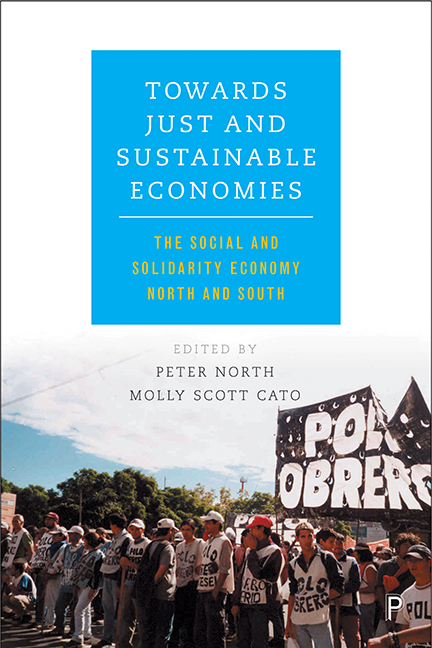Book contents
- Frontmatter
- Dedication
- Contents
- List of figures and tables
- Notes on contributors
- Acknowledgements
- One Introduction: new economies North and South – sharing the transition to a just and sustainable future
- Part I Theoretical perspectives on the social and solidarity economy
- Part II The social and solidarity economy as a site of social innovation
- Part III The social and solidarity economy and the state
- Part IV Policy translation between North and South
- Index
Four - Co-construction or prefiguration? The problem of the ‘translation’ of social and solidarity economy practices into policy
Published online by Cambridge University Press: 05 April 2022
- Frontmatter
- Dedication
- Contents
- List of figures and tables
- Notes on contributors
- Acknowledgements
- One Introduction: new economies North and South – sharing the transition to a just and sustainable future
- Part I Theoretical perspectives on the social and solidarity economy
- Part II The social and solidarity economy as a site of social innovation
- Part III The social and solidarity economy and the state
- Part IV Policy translation between North and South
- Index
Summary
At the beginning of the 21st century, Latin America was characterised by a condition of political transformation. The social and labour mobilisations against neoliberalism that emerged during the 1990s facilitated the accession to power of new centre-left political forces and coalitions that took on board movement demands and cooperative practices and transformed state structures, legislation and institutions to the extent that they were collectively christened the ‘pink tide’. The ‘21st century socialist’ and ‘neo-developmentalist strategy’ under the leadership of Hugo Chávez, Evo Morales, Néstor Kirchner and Rafael Correa among other political leaders encouraged and supported grassroots movements financially and politically in many ways, especially via policy – and especially the social and solidarity economy (SSE). While these policies reflected the movements’ political demands for state recognition and support for their SSE cooperative projects, the governmental strategy also responded to the growing pressure from international organisations towards obtaining the engagement, participation and support from social movements and SSE organisations for new public policies and laws in order to facilitate their access to the new policy schemes (Fonteneau et al, 2010; UNRISD, 2010). On the one hand, this underscores the growing importance of civil society actors (including social movements) in rethinking ‘development’ and the co-production of policy, particularly in the current period of global crisis. On the other hand, it ‘translates’ SSE practices as befitting neoliberal decentralisation. By translation, I mean the processes, mechanisms and dynamics through which the state incorporates the cooperative and solidarity ethos of SSE grassroots practices into policy.
This chapter presents three ideas. The first is that, as autonomous practice, the SSE can be a tool for ‘organising hope’ (Dinerstein, 2015), that is, a practice that enables the anticipation of alternative reality/future practices, relations and horizons – in the present. Hope is not synonymous with the wish for a better future, dream or fantasy, but, following German philosopher Ernst Bloch (1986 [1959]), its utopian function allows us to engage with the unclosed nature of the world. To Bloch, there exists in the present a concrete possibility of prefiguring what he calls ‘the-not-yet-become’. Hence, hope is not wishful, but wilful, that is, it guides concrete praxis (Levitas, 2013).
- Type
- Chapter
- Information
- Towards Just and Sustainable EconomiesThe Social and Solidarity Economy North and South, pp. 57 - 72Publisher: Bristol University PressPrint publication year: 2017
- 1
- Cited by

